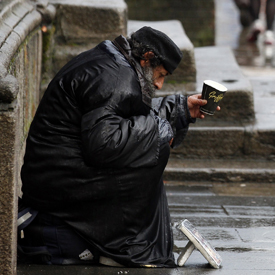Squatting: criminal offence or housing solution?
 Ciaran Jenkins
Data Correspondent and Presenter
Ciaran Jenkins
Data Correspondent and Presenter
Ahead of next week’s vote to criminalise squatting, Channel 4 News investigates why squatters take over empty homes – and why the government, and many homeowners, want it to be made illegal.
Whether it is a creative community looking for studio space, or homeless individuals desperate for a bed, squatting has long been part of Britain’s housing landscape. When the massive Huntley Street squat in Bloomsbury was evicted in 1978, protests were staged across the world in solidarity.
But all that could all change after next week. The House of Lords will vote on the Legal Aid, Sentencing and Punishment of Offenders Bill, clause 130 of which relates to the criminalisation of squatting.
At the moment, squatting in an empty property is a civil dispute between the squatters and the landlord, rather than a criminal offence. As long as a squatter has not broken in and remains in the house, they can’t be forcibly removed and property owners have to get a court order to get people out – something they argue is costly, and time consuming.
Homeless squatters have extremely high incidences of mental and physical ill health, learning disabilities, drug and alcohol dependency and a raft of other disadvantages. Leslie Morphy, Crisis chief executive.
If the proposed change to the law goes through, squatting would become a criminal offence – police will be allowed to force entry and arrest anyone who has occupied a property. There could even be prison sentences for squatters if they are prosecuted.
“We’re legislating simply to make a statement of the blindingly obvious – stealing someone else’s property is not allowed,” Crispin Blunt, Minister for prisons with responsibility for sentencing policy told Channel 4 News.
“We need to send a clear signal that squatting is unacceptable.”
High profile cases
The proposed change has garnered increasing support following a series of high profile cases like that of Julia High. Last year the 55-year-old came back to her east London home after a weekend away, to find that a family of eight had moved into her house. When she was able to get back in to the house, she said she found £40,000 of damage.
Another high profile case was that of Dr Oliver Cockerell and his pregnant wife Kaltun, who bought a house in West Hampstead, north-west London last August, but when they arrived at the house two days later, a group of squatters had moved in.
Lack of affordable homes
But many squatters, and housing rights charities, argue that the cases which make the headlines are a small minority – and that people resort to squatting because of a lack of affordable homes, not just as a form of protest or art project.
“Most of the time, squatting is about finding an empty property that has been empty for a long time, and moving in,” one east London squatter told Channel 4 News. “It’s important for us that the property is empty and abandoned, because we want to be there for a long time. For the majority of squatters, that is the case.”

Rising homelessness
Figures published on Thursday found a 14 per cent rise in homelessness over the last year alone, with almost 50,000 households across England classed as homeless.
The housing charity, Crisis, says that 40 per cent of homeless people have squatted at some time. “Homeless squatters have extremely high incidences of mental and physical ill health, learning disabilities, drug and alcohol dependency and a raft of other disadvantages,” said Leslie Morphy, Crisis chief executive.
“They squat out of necessity, not choice, in atrocious conditions where they are least likely to be disturbed. These are people that need help – not a year behind bars and a £5,000 fine.”
Added to the housing shortage problem, is the fact that there are nearly 930,000 empty homes in the UK – buildings which are sitting empty, some of which are council owned, as rents rise and fewer people can afford their own homes.
Depending on the outcome of the vote next week, the growing number of the UK’s homeless will no longer have squatting as an option.
But not everyone buys the idea of squatting as a solution to homelessness.”It is not a homelessness strategy to say that people can squat in empty homes that belong to somebody else, far less property that is occupied by other people,” Mr Blunt told Channel 4 News.
-
Latest news
-
Yungblud launches his own affordable music festival5m

-
Why these Americans want to quit their state9m

-
Company behind infected water outbreak are ‘incompetent’ says local MP5m

-
Israeli forces push deeper into Northern and Southern Gaza4m

-
India’s ‘YouTube election’: Influencers enlisted to mobilise youth vote6m

-




